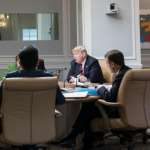On Friday this past week, AT&T
The deal will make AT&T the third-largest entertainment company by revenue, larger than media rival Netflix
The Justice Department had challenged the merger, which it felt would limit consumer choices and raise prices for services, on antitrust grounds. But on Tuesday, federal judge Richard J. Leon ruled in favor of the companies without imposing any conditions or instructing either company to divest from any assets. The Justice Department had six days to seek an emergency stay of the deal, which would have delayed the merger by four to six months, but did not seek one. The agency could still seek an appeal of the merger at a future date, though experts say they would be unlikely to win, and Judge Leon even cautioned them against it in his ruling.
AT&T and Time Warner deal is a vertical merger, meaning that the companies do not produce competing products: Time Warner produces media content, while AT&T distributes it. These vertical mergers tend to survive regulatory scrutiny, like e-retail giant Amazon's
Regulators instead tend to go after horizontal integration, preventing one company or group from owning too large a share of a specific industry. For example, in 2016 a federal judge prevented the merger of office supply retailers Staples and Office Depot
Although the judge's decision was limited in scope, it might be seen as ushering in a merger-friendly atmosphere. Major media companies will likely try to take advantage of this atmosphere and merge so that they can better compete with online entertainment giants like Netflix, Youtube
- http://about.att.com/story/att_completes_acquisition_of_time_warner_inc.html
- https://www.nytimes.com/2016/05/11/business/dealbook/staples-office-depot-merger.html
- https://www.reuters.com/article/us-time-warner-m-a-at-t/trump-says-att-plan-to-buy-time-warner-not-a-good-deal-idUSKBN1DL1GL
- https://www.nytimes.com/2018/06/12/business/media/comcast-fox-media-deal-att.html














